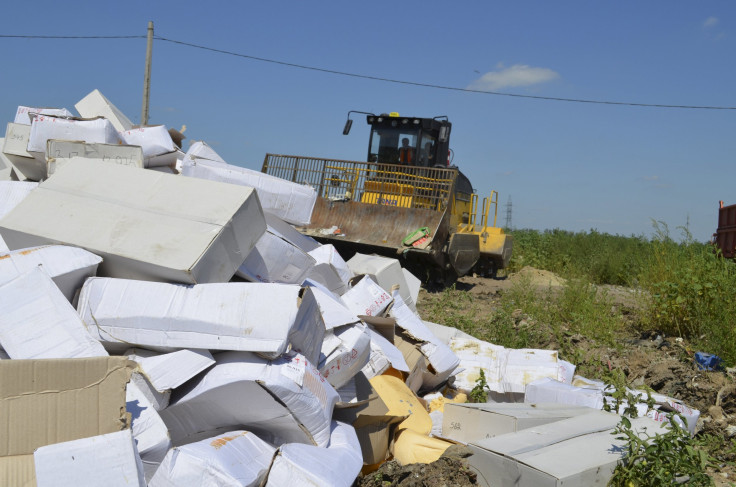Russian Food Sanctions 2015: Hundreds Of Tons Of Food Destroyed Since Restrictions Placed On Imports

A total of 738 tons of imported food has been destroyed in Russia since the Russian government imposed a ban on Western imports more than a year ago, says Russia’s agricultural watchdog, Rosselkhoznadzor, the Moscow Times reported Monday. Russian President Vladimir Putin signed the edict banning foreign imports in response to trade restrictions placed on Russia by Western nations due to its actions in Ukraine.
Russia has confiscated and destroyed 676 tons of illegal agricultural produce and has confiscated some 316 tons of animal products, according to the statement, which was published online. Only a fraction of the animal products, 62 tons, have been destroyed.
The policy has sparked considerable protest as video footage showed massive amounts of food being bulldozed, even as more than 22 million people live below the poverty line in the country. An online petition calling on the government to redistribute the food for free had more than 343,000 supporters as of August. "Why destroy the food when we can simply eat it?" wrote Olga Savelieva, the author of the petition, according to Al Jazeera English.
Demand for packet tea & tea bags increasing in Russia
Why this spells good news for India! http://t.co/ktCvvCduLn pic.twitter.com/jUlvWx6CJL
— EconomicTimes (@EconomicTimes) September 28, 2015
The food ban has been coupled with an economic slowdown that has seen a sharp currency depreciation, as the restrictions on foreign imports reportedly have driven up consumer prices. Russia also has struggled to replace foreign goods, Voice of America reported Sunday.
Deputy Prime Minister Arkady Dvorkovich has said producing enough domestic goods was a matter of time and that it was too early to analyze the effects of the import ban. Russian officials have said the policy could help boost the domestic market in the long run.
Experts have warned it could take months before Russia is able to produce the necessary domestic goods, although some farmers have thrived under the restrictions, Al Jazeera reported.
© Copyright IBTimes 2024. All rights reserved.












